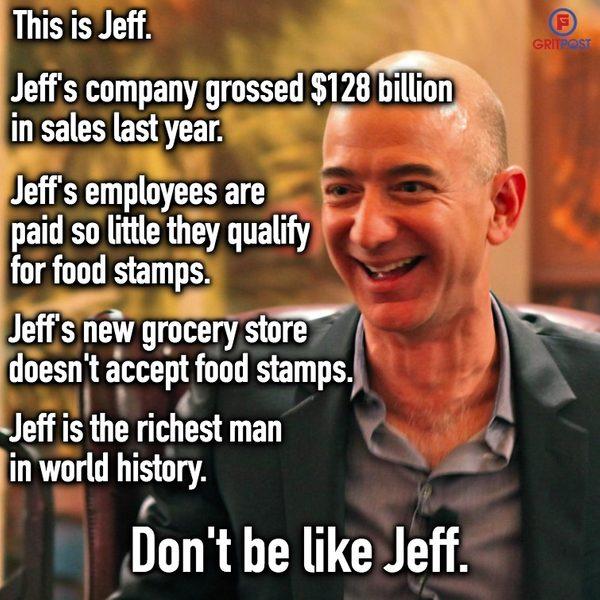If every single person on this planet had a roof over their head, food on their plate, and access to high-quality, free education and healthcare, then I promise I would sod off from ever caring about how many billions does Jeff Bezos have.
But until that day, I care a fucking lot.
That guy can decide to end world hunger, which would cost him only a tenth of his immense fortune, yet every single day he decides to be an absolute monster instead.
A billion dollars is more than a single person can ever reasonably spend in their lifetime. Meanwhile, he has 111 of them. And the only purpose that they serve is boosting this dude's fragile ego. I'm fucking sure that he regularly jerks off to newspapers reporting his wealth.
And on the other side of the spectrum you have millions and millions of people struggling to make ends meet. Not just in the countries devastated by centuries of colonialist exploitation, but even in what's called “first world countries”. Not just people who are “lazy”, but even those that are working two jobs to support their families.
This system sucks. It sucks so, so bad.
I'm obviously not saying everyone should earn and own the same amount of money and goods – that would be crazy and it might probably suck even more.
But let's redistribute the wealth at least this much so that nobody has to go hungry or homeless. We can do it. We can afford it.
I mean… For one, automation is coming. Nah, it's already there. It's been happening for ages. And it's not necessarily a bad thing.
Sure, many people will lose their jobs, and that's what media usually focuses on when discussing automation. But in the long run, it's probably gonna be for the best.
Automation doesn't just mean a robot will take your job. Automation also means that there's gonna be more of nice things that require almost no effort to be created.
Maybe we shouldn't think about it as a scary chalenge – but as an exciting opportunity! If we do it right, it won't kick you out of your job – it will allow you not to work.
If there's ten people doing a manual job who can be replaced with just one robot and one engineer to develop and maintain it, even if they cost three times the salary of a manual worker, at the end the same amount of goods has been created at just 30% of the original cost. If that process can replaces a hundred workers instead of ten – then the same same amount of goods can be created at 3% of the original cost.
We already have plenty of precedents of this happening, but probably none as drastic and obvious as… books!
Germany, 1440, Johannes Gutenberg is starting the revolution that I'd argue was the most important one in the history of humankind. He builds the first printing press.
He's not just automating the manual process of copying books by hand. He's giving the world the gift of accessible information.
Before that, a book would cost as much as the entire village. I have no idea how much it'd be in today's money, but probably millions. And now, 600 years later, you can get one for 10, 20, 30 bucks… The cost of books has dropped by 5 or 6 orders of magnitude! That's huge!
But the printing press has had way more benefits than only making books cheaper. It also freed them from copying errors. It gave the world an incentive to teach reading and writing to people who would otherwise stay illiterate. It sped up the process of sharing knowledge practically exponentially. I'm pretty sure that we indirectly owe like 99% of all inventions after the 16th century to the printing press.
Does anyone think that it's sad for the monks to have lost their jobs copying scripts? Exactly!
Automation might be sad and disruptive short-term, but will probably turn out to be way more beneficial a long run.
So there we are – in a world where things are cheaper, more available and more plenty than ever before. And yet, there's still so many who struggle for their most basic necessities.
That's. Fucked. Up.
Let's change it. Let's tax the ultra rich and use that money to provide a Universal Basic Income to everyone. Yes, we can afford it. I just told you how filthy rich are the filthy rich and how automation makes things unbelivably cheap and available.
The US is wasting 40% of all food, while more than 11 million of their children live in food insecure homes. We have plenty. We just distribute it in a terribly idiotic way.
UBI would solve most of that. It has plenty of advantages. It's the simplest social program you could imagine (and it could replace most of the existing ones). It's unconditional and universal, so it doesn't require much bureaucracy or supervision. It wouldn't deter people from working, as its critics claim, because its whole point is to be just high enough to cover the most basic needs, to give people's lives dignity, but still keep the incentive to work, if one wants to have any more than the basics. And yes, it's expensive, but we can afford it.
Actually, looking at how terribly are the most vulnerable hit during the covid-19 pandemics, seeing how inevitable further automation is, and seeing how extremely unjustly our wealth and resources are distributed – not only can we afford it, but I'd even say we cannot afford not implementing it.
 Avris
Avris
 Avris
Avris

